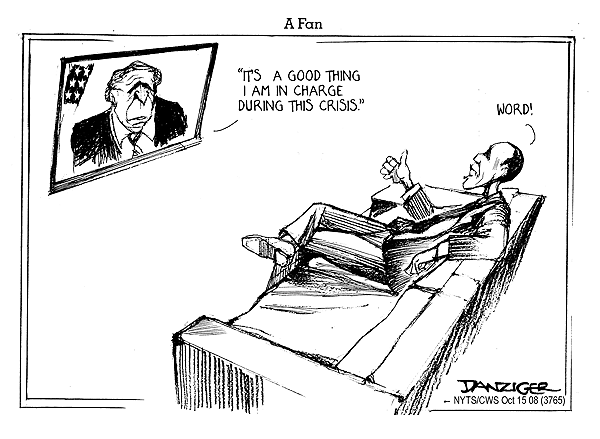By Gina Chon
As a foreigner here, any opportunity to have a social life is welcome, even when it requires some logistical planning. But what happened last night made me think I may be better off having no life while I'm in Baghdad.
Friday evening, an American journalist friend was having a party for his father, a doctor who happened to be in Baghdad to give some lectures. Since I was in the same area that his father was staying, I told him I would take his father and his father's friend to the party with me.
When we got to a checkpoint, we were told to get out of the car so it could be searched, which is normal procedure. We waited under a makeshift tent, as our car was examined on the other side of a tall concrete wall. We couldn't see what was happening but we figured after a few minutes, we would be on our way.
But the search was taking longer than we had expected. We thought it was because of a car bomb threat that had been reported earlier, which had shut down a nearby checkpoint. Then we noticed the guards at our checkpoint put their helmets on. Never a good sign.
Our Iraqi driver then noticed that our other Iraqi driver and guards who were in a second car were standing facing a wall. We had gotten separated from them at the checkpoint. We worried that they were being detained and we notified two security guys at the checkpoint that they were with us. They conferred with each other and then walked away.
A few minutes later, an American military police officer walked toward us and asked us to follow him. We thought he was clearing everybody out of the checkpoint as part of routine procedure and dutifully obeyed him. As we started walking down the street, the sergeant said, "If you make any moves, I will take you down hard. I don't care if you are a woman."
That's when I knew something was seriously wrong and we were actually suspected of doing something. I'm a small person and weigh less than 100 pounds so I'm not sure what he thought I was going to do. My friend's father is a small, older man. Besides my Iraqi driver, I was with another American and an Australian.
We walked down the street until we were told to sit in a row on the sidewalk, Indian style, facing the street. That's when I noticed across the street on the sidewalk were our other driver and guards. They were also in a row, but in a kneeling position with their hands on their heads.
Another American military police officer who came to guard us told me that the dog at the checkpoint had indicated he found something on our car, so the area was basically under lockdown. They thought our vehicle may be a car bomb. So we were waiting for an Explosive Ordnance Disposal (EOD) team to show up to examine our car.
I was stunned. As we sat in the row waiting for EOD, I talked to our security manager about what the dog could've found. The only explanation we could come up with was that our guards had been at the shooting range in the morning, so the dog may have picked up on residue from that. I also wondered why our Iraqi staff on the other side of the street were being treated worse than us when it was our car that was under suspicion.
When the military vehicle carrying the EOD team showed up, the back door opened up. Down the ramp came one of those EOD robots that are used to check for explosives. My Iraqi driver and I couldn't help it. We burst out laughing. We couldn't believe that they were sending a robot to make sure our car wasn't laden with explosives. The last time I had seen an EOD robot was in May in Sadr City. A roadside bomb had gone off and disabled a U.S. military vehicle, and an EOD crew was sent in to check out the scene.
After the end of the hourlong ordeal, we were told that we were all set and we could be on our way. No longer in the mood for the party, we all went home.
But I did get a taste of what it must be like for innocent Iraqis who are suspected of wrongdoing. Of course, the guards at the checkpoint and the American MPs were following procedure and doing their jobs. But I knew we were treated better because we were Westerners and could speak English with the MPs. After a few minutes, we began talking about our hometowns, how long we had been in Iraq and other small talk topics. One of the MPs then walked over to our Iraqi staff across the street and told them they could put their hands down and sit in a more relaxed position.
For an Iraqi who doesn't know English and isn't connected to Westerners, those kinds of situation must be terrifying. We were kept in the dark about what was going on until the MP told us he would "take us down hard" if any of us tried anything. But I knew that as an American, nothing would really happen to me and even if something did, I knew how to navigate the system to deal with the situation. Most Iraqis aren't as fortunate.
